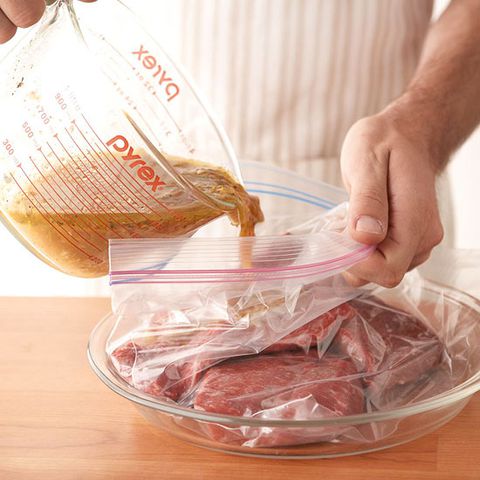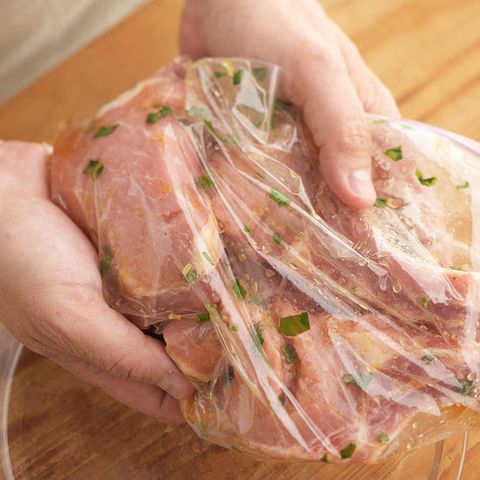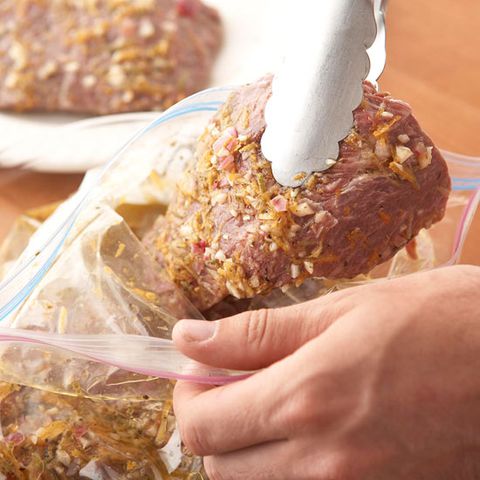Add loads of flavor to meat, poultry, fish and veggies with these expert tips.
Marinades generally consist of cooking oil, an acidic liquid, such as vinegar, wine, tomato, or citrus juice (or a natural enzyme, such as ginger or pineapple), and flavorings, including garlic, molasses, honey, fresh or dried herbs, and spices. The acids help the marinade soften tough cuts of meat, while the oils moisten the meat and add flavor. Salt can also be used to season and tenderize the meat.
Marinades should be thin in consistency so they can penetrate the meat to reach the desired flavor. The marinade penetrates about 1/4 inch into the surface of the meat. It won't reach the meat's interior, but the surface will be flavorful.
How to Marinate Chicken, Steaks, and More
Here's our Test Kitchen's preferred method for marinating chicken, beef, vegetables, and more.
Step 1: Place Food in a Bag
Put up to 3 lb. Steak, chicken, pork, vegetables, fish, or seafood in a resealable plastic bag. Set the bag in a bowl or shallow dish in case the bag leaks. Pour the marinade over the food, seal the bag, and place it in the refrigerator.
Step 2: Ensure the Meat Is Coated
Chill and turn the bag occasionally, so the marinade is distributed evenly over all sides of the food. Plan on allowing 2 to 12 hours for chicken, pork, or marbled beef; 2 to 4 hours for tender beef, vegetables, or lamb; or 30 minutes for fish or seafood. Don't marinate in a metal container because the acidic mixture can react with the metal.
Step 3: Remove from Marinade and Cook
Use tongs to remove food from the marinade. Some of the marinade will stick to the food. Discard the remaining marinade.
How Long to Marinate?
Tender cuts of meat need up to 2 hours of soaking time. Less tender cuts of meat require 4 to 24 hours but don't overdo it. Meats and poultry marinated for more than 24 hours can turn mushy. Avoid marinating meat in citrus or pineapple juices for too long as they can cause a mushy texture.
Marinate fish for just a few hours; if left any longer, the acidic ingredients will begin to "cook" it and make it tough.
Food should be cooked immediately after marinating. Marinating doesn't extend food's shelf life, which includes the day of purchase and thawing time.
How to Marinate Safely
These tips will help you marinate your food safely:
- Marinate foods in the refrigerator; don't leave them on the kitchen counter. Place them on the bottom shelf of the refrigerator to prevent any possible leaks or spills onto the foods below.
- Don't return cooked meat to the unwashed plate you used to carry the raw marinated meat to the oven or grill. Marinated meat is still raw and should be handled accordingly.
- Never reuse marinades to prevent the risk of contamination that can lead to food-borne illnesses. Before adding marinade to the raw meat, set some aside for basting or as a table sauce.
This article was written by Sheena Chihak, Sarah Martens and Rd from Better Homes and Gardens and was legally licensed through the DiveMarketplace by Industry Dive. Please direct all licensing questions to legal@industrydive.com.









